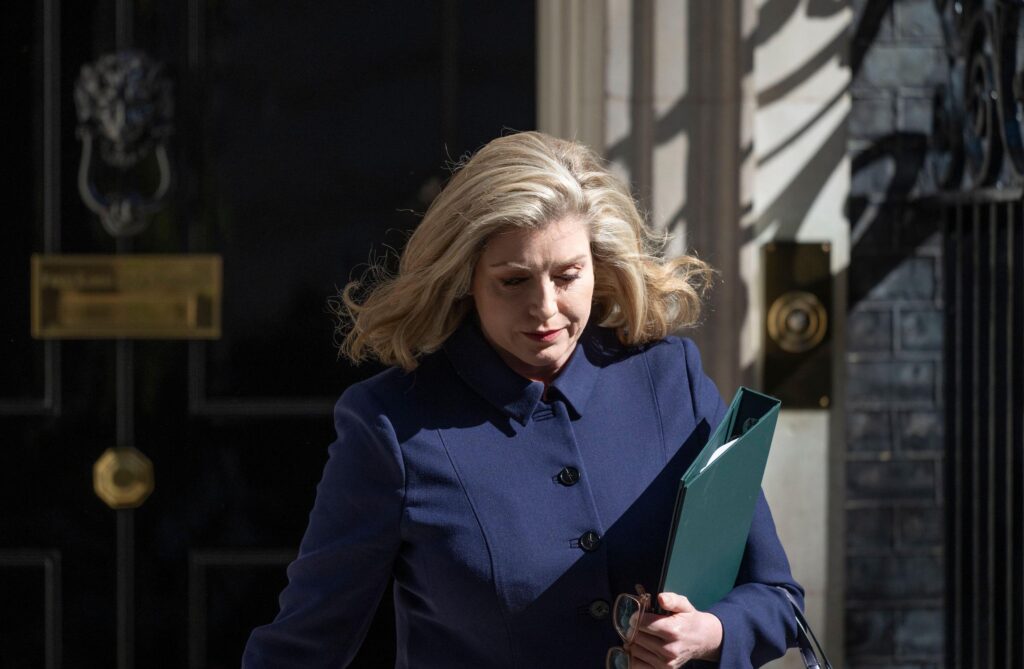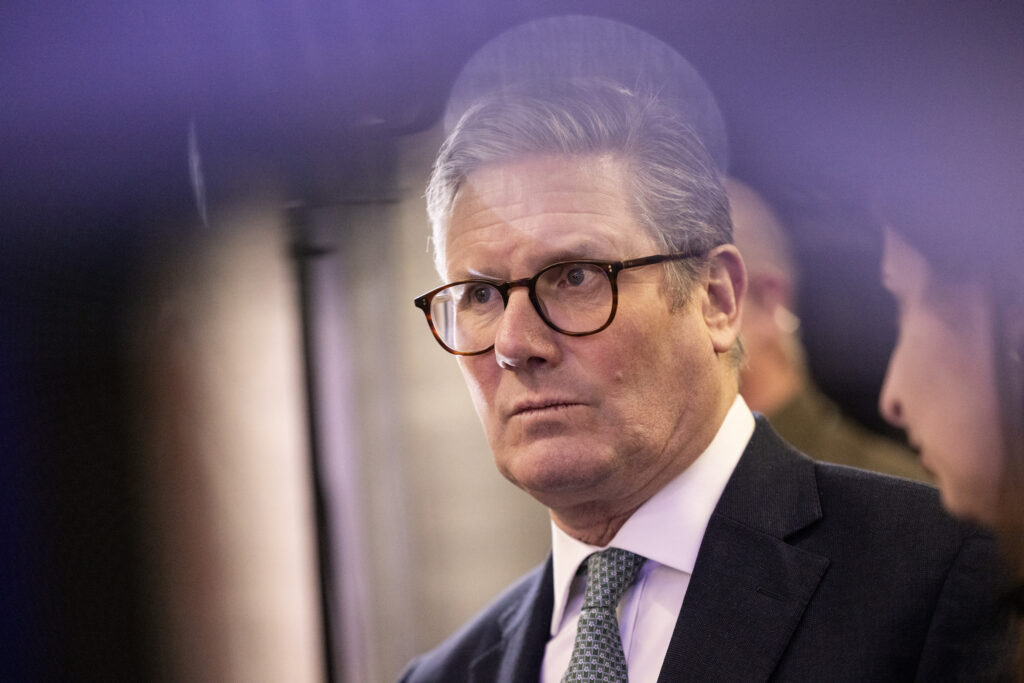The below content first appeared in Politics.co.uk’s Politics@Lunch newsletter, sign-up for free here and never miss this essential election briefing.
Silent or silenced? Conspicuously little has been heard from Penny Mordaunt — of Conservative leadership contest and sword-carrying fame — since the prime minister shocked Westminster by calling an election almost two weeks ago.
Prior to parliament’s dissolution, the House of Commons leader had been busy embracing her self-styled status as a frothing Tory attack dog, taking chunks out of the Conservatives’ opponents on a weekly basis. At business questions, Mordaunt’s nominal task was to set out the provisional commons schedule for the following week, before dealing with MPs’ representations about possible debates. As Theresa May found with Andrea Leadsom in 2017, the despatch box on a Thursday morning is the perhaps ideal place to hide a vanquished if enduringly ambitious rival. (It was, remember, the politically paranoid Liz Truss who first appointed Mordaunt as commons leader).
Since 2022, however, House business questions have become better known for their political fireworks, sent fizzling through the chamber by Mordaunt. You may be familiar: the most explosive exchanges are quickly clipped up and shared on social media by Mordaunt’s team. Westminster’s cynical commentariat, needless to say, viewed the performances through the prism of the commons chief’s leadership ambitions.


On 23rd May, in what appears to be Mordaunt’s most recent contribution since the election was called (on 22nd May), she warned voters against backing the “ruthless socialists” of Labour. Staring down the barrel of the despatch box, the commons leader fired: “We Conservatives may be the underdog, but we are on the right side— and that is on the side of the British people”.
Almost two weeks on from this exchange, however, and people are starting to clock Mordaunt’s out-of-character quiet.
Over the weekend, a Mail on Sunday report quoted Mordaunt “allies” anonymously expressing their concerns that the commons chief was being “kept in a box” this election. One “veteran Conservative” told the paper that Mordaunt should actually be “front and centre” of the campaign — with others suggesting that not letting Mordaunt lead on national service was a missed opportunity.
There are myriad ways to account for Mordaunt’s relative quiet this election. One explanation would point to the very nature of the Conservative campaign, which has adopted a highly “presidential” feel. Even during an election campaign, the political limelight is limited — and Sunak, so far, has soaked up more than his fair share. That the apparent opportunity cost is Mordaunt’s profile will hardly concern No 10.
Nor is this, it should be stressed, an especially novel approach from Sunak’s strategists. Just days before the election was called, veterans minister Johnny Mercer accused the PM of hogging the political spotlight as if he was “as popular in the polls as he was two years ago”. Mercer’s private memo went on to explain: “We are only going to get through this as a team. There are good, capable senior colleagues around the Cabinet table who people clearly like, who should see more air time and be more prominent.”
Mercer’s message was clear: No 10 is sidelining effective cabinet colleagues for fear of promoting their image at the PM’s expense. The veterans minister, ultimately, failed to see the logic of running such a Sunak-centric operation in light of the PM’s low personal ratings. The underlying wisdom of Mercer’s counsel has only become more obvious as the election has unfolded.
As such, any remaining airtime not taken up by Sunak this campaign has been apportioned among the PM’s loyalists: transport secretary Mark Harper, energy secretary Claire Coutinho, work and pensions secretary Mel Stride and chief secretary to the Treasury Laura Trott are regulars on the broadcast round. As Mercer recently queried: “We have average performers during important slots. How many people did [Mark] Harper win over for us this weekend?”
The prime minister, in fairness, finds himself in a classic political bind: he is forced to choose between loyal if lacklustre media performers and potentially more bracing spokespeople who could abuse an opportunity for their own political purposes.
Mordaunt, according to No 10’s apparent calculation, would fall into the latter category. And you can see why: in the months leading up to the election, rumours abounded that Conservative rebels planned to enstool Mordaunt as Sunak’s replacement as PM. The commons leader insisted at pains that she had nothing to do with the anti-Sunak briefing; but Mordaunt’s dismissal of the rumours in the commons, in which she flippantly likened herself to a “new boiler”, only raised eyebrows in Westminster.
Penny’s penchant for freelancing is, in short, well-studied in SW1. Just months ago, the commons chief pointedly suggested Sunak should “reflect on his actions” after the PM accused Keir Starmer of being unable to “define a woman” — while the mother of murdered transgender teenager, Briana Ghey, was on the parliamentary estate.
Certainly, whatever the reasoning informing Mordaunt’s absence, we have come a long way since the commons leader acted as Sunak’s conference warm-up act last October — calling on her Conservative comrades to “stand up and fight”. No 10, one could reasonably reflect, is not allowing Mordaunt to take her own advice this election.
But perhaps Mordaunt is standing up and fighting after all — albeit in a more contained, self-interested sense. Polls continue to predict that the commons leader will be routed in her constituency of Portsmouth North on 4th July. Labour, having held the seat from 1997 to 2010, looks set to make a comeback.
In fact, the most recent “mega” MRP poll, conducted by Electoral Calculus on behalf of GB News, has the Conservatives on just 25 per cent in Mordaunt’s constituency — some distance behind Labour’s 43 per cent. Mordaunt, of course, cannot become Conservative leader if she ceases to be an MP.
On top of this, Mordaunt may be making a further calculation that, as a likely future leadership challenger, she should distance herself from the coming cataclysm. Having served as commons leader since 2022, not possessing a departmental record stained by association with Sunak’s government has arguably played to Mordaunt’s advantage. In this way, by focussing on her campaign in Portsmouth North, the commons leader can maintain her distance: an especially potent detail if she thwarts the national swing in her own seat.
Moreover, Mordaunt seems set to run as a moderate in a future Conservative leadership contest — relative, certainly, to her right-wing competitors (including but not limited to: Kemi Badenoch, Suella Braverman and Robert Jenrick). As the election campaign progresses, the prime minister’s pitch is only likely to get more right-wing in its outlook — with culture wars lent into and a new policy on illegal migration, perhaps pertaining to the ECHR, set to emerge. In time, Mordaunt could be well-placed to seize on the failure of such messaging as a leadership challenger.
That said, the case of Kemi Badenoch might suggest that Mordaunt is not destined to remain on the margins for the entire campaign. The business and trade secretary had been another cabinet member conspicuous by her absence in recent days — however, she could be found leading the Conservative line this morning on culture wars.
Only time will tell if Mordaunt follows suit. But, for the reasons outlined above, I wouldn’t count on it.
Josh Self is Editor of Politics.co.uk, follow him on X/Twitter here.
Politics.co.uk is the UK’s leading digital-only political website. Subscribe to our daily newsletter for all the latest election news and analysis.











